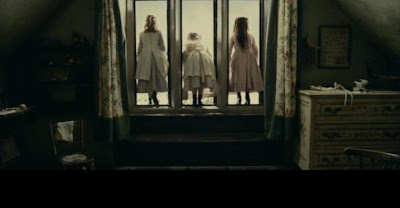 |
| Alternate title: Clingy Bitch |
Arthur Kipps (Daniel Radcliffe) has been a widower ever since his wife died giving birth to their son, about three or four years ago. You'd think he would have the hang of it by now, but no. Kipps has been moping around literally for years --- even his son always draws Kipps with a frowny face --- and his law firm has had enough. If he can't pull his own weight, he will be fired. His last chance is to settle the estate of the late Alice Drablow in Creepytown, UK. Alice lived in a house that was isolated 3/4 of the day by the tides of the local marsh, and apparently left a ton of official documents lying around there.
 |
| Yep. That looks like Gothic horror to me |
 |
| Porcelain dolls are creepy and they want your soul. Fact. |
Sadly, this is not an isolated incident; it seems that dozens of local kids have committed suicide in this town over the past several years. But why do the townspeople blame Kipps for the girl's death? And what does this have to do with the woman in black?
Gothic horror is certainly not for everyone. Personally, I'm not a big fan of the sub-genre, and The Woman in Black generally adheres to the traits common to the style. If you sit down to watch this, be prepared for a fairly slow-paced plot, period piece costumes, an emphasis on suspense and atmosphere over gore, and a healthy respect for the paranormal. As far as the style goes, The Woman in Black is a pretty solid example of how to do it right in the modern era; if they had traded some of the anticlimactic "gotcha" scares for some more disturbing images, I would call this an excellent exercise in Gothic horror.
 |
| If that face in the window gives you the heebie jeebies, you might be a Gothic horror fan |
Daniel Radcliffe was solid in his first post-Potter starring role. He doesn't erase your memory of his childhood work (perhaps a different haircut or a beard would have helped), but darn few things will. Brain Bleach would be a catchy name for one. The lead in atmospheric horror movies is typically supposed to slowly react to the rising eeriness, hopefully in a manner similar to how the audience would react. Radcliffe doesn't "wow" you with his skills, but his reactions felt genuine enough.
 |
| A hatchet to face possible ghosts? Stupid, but I'd grab one if I could |
The Woman in Black is only the second film directed by James Watkins, but it was a pretty good effort. He made a successful film with Daniel Radcliffe looking worried in every scene; it is tough to make a decent horror movie in general, but one that focuses almost exclusively on a single character is a lot harder. The pacing could feel dreadfully slow in the first half of the film, but Watkins was wise enough to show several deaths to spice things up. I will say, though, that The Woman in Black has more child suicides in it than any other movie I have seen.
 |
| They can't fly |
Despite generally liking most of the ingredients in The Woman in Black, I didn't like it all that much. Part of that is because I generally dislike Gothic horror --- give me a machete-wielding maniac any day --- but there were just too many small things that bugged me in this movie. From a directional standpoint, I thought the off-screen wailing of the mothers who lost their kids was a bit melodramatic; I get it, grief isn't pretty, but couldn't they have lines less cliche than "My bay-bees! Waaaugh!" From a story standpoint, I don't see why all of this had to happen. SPOILER ALERT: The townspeople believe that going to the house will inevitably lead to meeting the woman in black, who will inevitably then kill an apparently random child for some reason; okay, fine, I can follow that logic. So why would anyone in the town agree to drive Kipps there? And why doesn't he just grab all the papers from the house and take them back to London, so he can go through them in an honest-to-God office, instead of a dusty haunted house?
 |
| Probably not for the helpful notes on the walls |
 |
| A: Because he hasn't figured out windows yet, either |
If found it interesting that much of the promo work for The Woman in Black featured old timey photographs with the eyes scratched out, some with the caption "What did they see?"
Okay, pretty creepy. However, that isn't fully addressed in the film. Now, you might argue that the answer to that question is ni the title of the movie; I can buy that argument up to a point. But what about the kids? The logic in the film states that the adults are the ones responsible for the seeing-thing. Interestingly, the kids' eyes are left unscratched in the actual film. In fact, the scratched photos look more like the faces are being attacked than just the eyes. Weird, huh? What an odd choice for the film's advertising team.






























